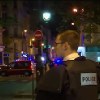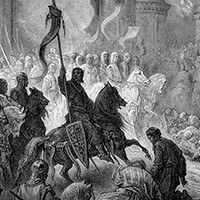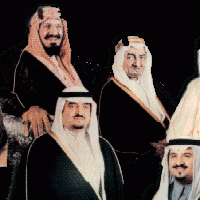![]()
Wed, Dec 29, 2010 | WikiLeaks
WikiLeaks: A quickfire Tour of Muslim Britain
Two US officials dip into Muslim communities in Luton, Leicester and east London and are struck by the range of opinions and cultures on display.
Source: WikiLeaks
Thursday, 25 October 2007, 16:38
C O N F I D E N T I A L SECTION 01 OF 05 LONDON 004045
SIPDIS
EO 12958 DECL: 10/17/2017
TAGS PGOV, PREL, KISL, PTER, SCUL, UK
SUBJECT: EUR SENIOR ADVISOR PANDITH AND S/P ADVISOR COHEN’S
VISIT TO THE UK, OCTOBER 9-14, 2007
REF: LONDON 4030
Classified By: DCM Richard LeBaron for reasons 1.4 b, d1. (C) Summary. EUR Senior Advisor for Muslim Engagement Farah Pandith and S/P Member Jared Cohen met with a wide range of UK government leaders, community activists, think tanks, artists, and Muslim youth during their October 9-14 visit to the UK. Government officials stressed that the UK’s problem with extremists is a domestic as well as a foreign policy issue, since all recent successful and thwarted terrorist attacks were perpetrated by individuals from Muslim communities in the UK. Muslim youth from deprived areas expressed less concern with UK and U.S. foreign policy than with the chance to have their voices heard in British society, while those with more education focused on disagreements with UK foreign policy and the need to use the arts to address cultural tensions and reconciliation. Bollywood actors and executives agreed to work with the USG to promote anti-extremist messages through third party actors and were excited about the idea of possibly partnering with Hollywood as well. Community activists discussed how they are working to empower their communities and help shape the debate against extremism in UK Muslim communities. One highlight of the visit was a day trip to Leicester, which Pandith said was arguably home to the most conservative Islamic population she had seen anywhere in Europe. End summary.
Radicalization Efforts
————————————
2. (C) HMG is currently working on an updated strategy, yet to be blessed by ministers, to update and improve its approach to stopping terrorists and extremists, FCO Engaging the Islamic World Group Head Barry Lowen and Arab Reform Team Leader Alex Cole told Pandith and Cohen October 12. The new strategy includes the creation of the Research and Intelligence Communications Unit (RICU), which falls under the joint auspices of the FCO, the Home Office, and the Department for Communities and Local Government (DCLG). Although still in the “embryonic stage,” Lowen said, the RICU would have three primary functions: 1) tracking and coordinating research and information on extremism in the UK Muslim Community; 2) alerting HMG to important events, such as an impending Osama Bin Laden speech, and preparing a unified government response; and 3) supporting non-government tools in battling extremists (For more on the RICU and HMG’s counter-radicalization structure, see ref). One project currently underway is preparation of a paper on what language works best in public outreach, Lowen said; for example, the advantage of using the word “mainstream” to define common values, as opposed to “the West,” which can have negative connotations.
3. (C) Work on empowering moderate Muslim voices in the UK and overseas is divided into aid directly from HMG and facilitation of contacts between non-governmental actors, Cole said. Programs which HMG sponsors directly include: sponsoring Arabic language children’s television programming in Jordan to promote peace and tolerance; assisting visiting religious leaders and journalists from UK-based Muslim communities to meet the Archbishop of Canterbury and other church leaders; and providing English language training to tutors at Al-Azhar University in Cairo through the British Council. On the non-governmental side, HMG is also currently working to facilitate linkages between third party actors, Cole said. Pandith noted these efforts mirror current USG initiatives. She and Cohen described USG efforts at “seeding” small initiatives overseas to see what works and what doesn’t. Both sides agreed they would exchange ideas for promoting counter-radicalization efforts, both those directly and indirectly sponsored by governments.
4. (C) With the FCO’s Policy Planning Middle East analyst Richard Shaw, Cohen described current USG thinking on the linkage between public diplomacy, counter terrorism, and counter radicalization. Shaw said the UK’s overall approach is focused on how likely Muslims are to turn to violence. Unlike the U.S. September 11 attack, Shaw noted, all of the UK terrorist attacks and would-be attacks have been perpetrated by “home grown” terrorists. What is considered foreign policy for the USG is both domestic and foreign for the UK, he pointed out. Pandith, Cohen and Shaw discussed the importance of trying to work with youth through web-based technology and communications, since these are some of Al Qaida’s primary tools. They also discussed the limitations of traditional outreach methods, including government-supported exchange programs, which pay off handsomely for those who participate but reach a mere handful of people, many of whom are already inclined to anti-extremist sentiment. Foreign Secretary David Miliband is focused on exactly these types of questions, Shaw said.
The Personal Journey of the UK’s, First Muslim MP
——————————————— ————–
5. (C) On October 12, Pandith and Cohen met with newly-appointed Department for International Development (DFID) Minister Shahid Malik. A Labour MP since 2005, when he and fellow Labourite Saddiq Khan were the first Muslim MPs ever elected to the British Parliament, Malik is an active participant in the British Muslim dialogue. He told Pandith and Cohen his own personal story of alienation, saying that even though he grew up in the UK he was so anti-British as a young man that he rooted for the other side in any sporting match in which an England team played. At the age of 27, however, he was appointed to the Commission for Race and Equality, and began to travel around the UK and listen to the stories of other Muslims. This was a turning point in his life, he said, because he realized that many Muslims were finding ways to celebrate both their Muslim and their British heritages simultaneously. In his public appearances, Malik said, he emphasizes that anger over UK or U.S. foreign policy is not a valid reason for extremism. By the same token, he said, it is important to separate out extremists from the vast majority of law-abiding Muslims. He praised Gordon Brown’s handling of the thwarted July car bombings in London, noting the Brown had referred to the perpetrators as “criminals,” without mentioning their religion.
6. (C) HMG needs to organize itself better on Muslim engagement, Malik admitted, and work to empower young people and make sure their voices are heard. A lot of important work is being done on education, where the Mosques and Imams Board (MINAB) has been set up to evaluate the credentials of imams to ensure that Muslim youth are being taught by qualified teachers. Pandith suggested that the two governments work more closely together, wondering if Malik would be interested in working with other elected Muslim officials around Europe who were keen to engage youth, act as role models, and learn from each other. Malik was very keen to help make this happen; Pandith will follow up with him.
7. (C) Pandith also raised the critical need for a place in Europe where religiously curious youth could go to learn more about Islam and specificially learn about it as a Muslim in Europe. Finding a “campus” where students could go to learn about theology as well as religion, history, culture, and science was a necessary missing piece in Europe. Malik agreed and said he would follow up with further thinking about this issue.
Female Muslim Role Models
————————-
8. (SBU) Pandith met Lady Sheikh, wife of Conservative Peer Lord Sheikh and herself a party activist, at her offices adjacent to Westminster Abbey on October 11. Sheikh said Muslim communities are economically the most deprived in Britain, and stressed the importance of educating and encouraging British Muslims to participate in democracy. She expressed an interest in receiving American female Muslim visitors whom she could introduce to young Muslim women to serve as role models. Pandith said the USG engages in outreach of this kind and told Sheikh the Embassy would keep her request in mind when programming such exchanges.
Visit to Leicester
——————
9. (SBU) On October 11, Pandith and Cohen traveled to Leicester, a large urban center about 70 minutes north of London with a substantial ethic minority population. Leicester’s Muslim population is 11 percent, well above the overall UK percentage of three percent. The visit was organized by Parvin Ali, founder and Chief of Executive of FATIMA Women’s Network, which aims to address Muslim women’s issues both locally and nationally. Pandith and Cohen toured a number of Leicester’s commingled but distinct ethnic neighborhoods, including Highfields (lower income, predominantly ethnic Indian Gujarati, influenced religiously by the Wahhabi sect), Medway (Bangladeshi), Evington (mainly Muslim, middle class), Stonygate (progressive Jewish neighborhood with recent influx of more affluent Muslims), and Oadby (more prosperous and outside the city center). With over 200 mosques and madrasses in Leicester, Ali noted, the city has for the first time put up Eid decorations on the streets in Muslim neighborhoods. Diwali decorations have been a tradition for some time, Ali said, and the Diwali celebrations in Leicester are said to be the largest in Europe, and possibly the largest outside of India.
10. (SBU) Leicester’s progressive Muslims may be politically “quieter” because of the comparatively huge orthodox presence, Ali said. The large numbers of Gujarati immigrants who came to the UK had originally settled in East Africa, and so brought with them a unique cultural memory of immigration strategies that had worked there. These immigrants knew and recognized the importance of immediately building up community institutions, leading to the proliferation of mosques and other community institutions. In addition, Leicester’s ethnic climate is unique academically – the University of Leicester attracts numerous students from outside the area, even internationally, due to its academic prestige. DeMontFord University, by contrast, can then absorb more local populations, leading to a high level of ethnic diversity there.
11. (SBU) Members of the Leicestershire Constabulary’s Community Safety Bureau described to Pandith and Cohen how their main focus is neighborhood policing and anti-terrorism, including racially and religiously-related crime. These programs rely on non-police community actors, who advise, inform, and assist with police operations. The police force will inform key community members prior to a raid, so that once police action is taken, comprehensive information on the situation is made available immediately to the community, thus preventing rumors and a possible escalation of conflict. As a result, there has been a significant level of community engagement with law enforcement. Constabulary officials acknowledged that their success might be a useful information tool for others in the United States or UK. Pandith expressed interest in passing information on their work to the Department of Homeland Security.
12. (SBU) Despite the many positive programs in Leicester, the isolation of some parts of the Muslim community was striking. During a discussion with religious and community leaders at an Ahmadiyya mosque, Yaqub Khan, General Secretary of a local organization called the Pakistan Association, insisted that he had to teach young people in Urdu. When Pandith challenged him as to why he would use Urdu with children who were growing up with English as their first language, Khan insisted that there were no good books on the Koran in English. At a local book store, texts in English seemed designed to segregate Muslims from their wider community, urging women to cover themselves and remain in their homes, playing up the differences between Islam and other religions, seeking to isolate Muslims from community, and feeding hate of Jews to the young. Some Leicester Muslims seemed to have haphazardly thrown together different elements of Islam, pairing an Arabian Gulf-style hijab with a Pakistani shalwar kameez, for example. Girls as young as four years old were completely covered. Pandith commented afterward that this was the most conservative Islamic community she had seen anywhere in Europe.
Muslim Youth
————
13. (SBU) Pandith and Cohen attended three events specifically aimed at hearing the concerns of Muslim youth in London. On October 9 they traveled to the East London neighborhood of Waltham Forest, a largely Muslim area that is plagued by urban problems including drugs, youth gangs, violence (three young people were shot close to the meeting site that same evening), and a significant radical Muslim presence. There they met with young Muslims, journalists, and community leaders, including the Mayor of Waltham Forest and two Borough Councillors, under the auspices of the Active Change Foundation (ACF), a recently-launched leadership training program targeted at Muslim youth in deprived areas of East London. The ACF had just finished recruiting its first class of young men and women to participate in the ACF’s inaugural leadership training course. During the meeting, the young people present repeated several times to Pandith and Cohen that they want the skills and the opportunities to be able to represent their views to the media and to decision makers. Although the journalists kept interjecting foreign policy issues such as Iraq and Israel/Palestine, the young people stressed that while those issues might be of some concern, the real issues in their lives are jobs, education, and empowerment. After a lively exchange, the ACF students presented a grant application for Embassy consideration, and both sides pledged that the link forged that evening would be maintained.
14. (SBU) In contrast, Cohen met October 9 with a small group of more privileged Muslim youth in Kensington, a wealthy London district. This meeting was held under the auspices of Kensington Borough Councillor Mushtaq Lasharie, himself a British Muslim of Pakistani origin who is the first Muslim councillor for this predominantly non-Muslim area. The young people at this meeting, all with higher education, said they wanted to see reconciliation themes conveyed through the arts, especially music. Cohen urged them to turn their ideas into action.
15. (U) An Iftar sponsored by the Next Century Foundation and held in Pandith and Cohen’s honor October 10 drew such a large number of participants that the group was split in two. Participants included representatives of the Muslim Public Affairs Committee UK (MPAC), and the Leeds and Bradford Diasporas, the UK Turkish community, and Muslim community leaders. Discussion centered on foreign policy issues including Kashmir, Israel/Palestine, Afghanistan, Armenia/Turkey, and the spread of fundamentalist Islam. The wide variety of opinions expressed provided U.S. participants with a broad cross-section of the positions of the different Muslim communities in Britain. Cohen noted a distinct difference between the focus of these young people — all in their mid-20s with graduate degrees — as opposed to the group of more impoverished youth in East London, where discussions focused on integration and opportunity issues inside of Britain. This group focused entirely on foreign policy, and more specifically on U.S. foreign policy. Many of them had radical views, including that “America had 9/11 coming to it.”
Bollywood
———
16. (SBU) On October 10, Pandith and Cohen met with a cross section of the South Asian community working in film to discuss the potential of working with the Indian film industry – “Bollywood” – on delivering an anti-terrorism message. Participants included Director of Arts Versa Mohsin Abbas, Channel 4 TV Head of Multicultural Programming Farouk Dhondi, Producer Director Mahmood Jamal, Locations Manager Amjad Khan, and singer/actress Humeira Akhter, who has strong links with top Bollywood actors/actresses. A lively discussion produced a number of possible ideas, including developing ways to promote existing anti-terrorist films, and to develop funds for similar productions. Once such an anti-extremist genre is established, participants believed that major Bollywood figures would be willing to speak out on the issue. Humaira Akhtar has already gotten back to Pandith on possible stars in Bollywood interested in such a project.
Community Groups
—————-
17. (U) The National Muslim Communities Development Network (MCDM) arose from a series of meetings held by various UK Muslim communities, following the July 5, 2007 bombings in London. MCDM is now an independent structure intended to bring attention to the continuing work of existing organizations focused on countering extremism. It works to help develop and broaden emerging leadership within Muslim communities, bringing communities together through positive action and raising the standard of debate on Islam in Britain today. In a meeting October 10, MCDM members including Director Nadeem Kazmi, Muslim Media Network’s Munir Zamir, Waltham Forest Community Cohesion Office Munir Zamir, Citibank’s Nazish Zaid, Khayall Theater’s Luqman Ali, Jang’s Ali Murtaza Shah, and Art Versa Mohsin Abbas, exchanged views with Pandith and Cohen about the challenge of promoting a more sophisticated and nuanced approach to the debate on Islam in British society. All parties committed to continue to explore ways to support MCDM programs, while the MCDM leaders agreed to facilitate U.S. mission efforts to reach out to the British Muslim community. These leaders agreed to stay in touch with Cohen and Pandith about their progress in creating a network of activists.
Media
—–
18. (SBU) Taking advantage of the wide range of Diaspora media available in London, Pandith spoke to a cross section of the UK-based Muslim media during her visit, including Jang Daily News, the oldest Pakistani-community newspaper in the UK with a European circulation of about 23,000 readers; Emel Magazine, a high-end weekly glossy with a print run of 20,000: the Muslim Weekly, whose website receives 34,000 hits a day; and Al Hayat, an influential Pan Arab daily with a world-wide circulation of 160,000. Pandith stressed that the USG is interested in building a dialogue with European Muslims from which both sides benefit: this gives the United States a chance to dispel myths that its policies are anti-Islam, and Muslims gain a better understanding of how U.S. foreign policy is shaped. It also empowers Muslims to discuss their own religion directly, rather than allowing the media to interpret for them through soundbites and other filters. As this dialogue has improved, so has understanding, leading to cooperative efforts to develop and support grass roots movements that combat the destructive impulses of extremists. Drawing on her own experience as a Muslim American, Pandith sought to dispel some myths about Muslims in America, noting that they are free to honor their religion as well as their ethnic and cultural backgrounds. The tension between allegiance to one’s country and to one’s faith is mostly absent for American Muslims, she said, because America is a country of immigrants, many of whom emigrated seeking religious freedom. She was careful to point out that the history of immigration and integration in the United States has at times been painful, but stressed that as a country the United States has benefited greatly from the experiences of the Civil Rights Movement.
19. (U) EUR Senior Advisor Pandith and S/P Member Cohen have cleared this message.
Visit London’s Classified Website: http://www.state.sgov.gov/p/eur/london/index. cfm Tuttle



 RSS
RSS












WikiLeaks: A quickfire Tour of Muslim Britain | Middle East …: Pandith, Cohen and Shaw discussed the … http://bit.ly/gXNbBv #asematy
WikiLeaks: A quickfire Tour of Muslim Britain | Middle East …: Pandith, Cohen and Shaw discussed the … http://bit.ly/gXNbBv #asematy
#WikiLeaks: A quickfire Tour of #Muslim #Britain | #US http://j.mp/dNJooK
WikiLeaks: A quickfire Tour of Muslim Britain http://j.mp/hCvrOB via @AddToAny
RT @CrethiPlethi: #WikiLeaks: A quickfire Tour of #Muslim #Britain | #US http://j.mp/dNJooK
http://yfrog.com/hsi3s7p PIC FROM THIS WIKI DUC
https://www.crethiplethi.com/wikileaks-a-quickfire-tour-of-muslim-britain/usa/2010/